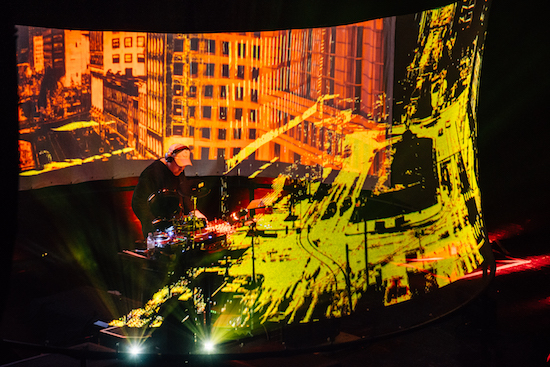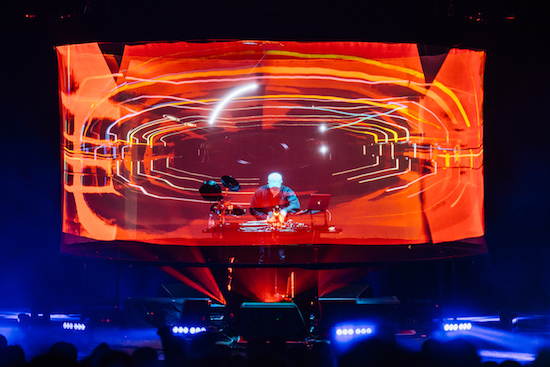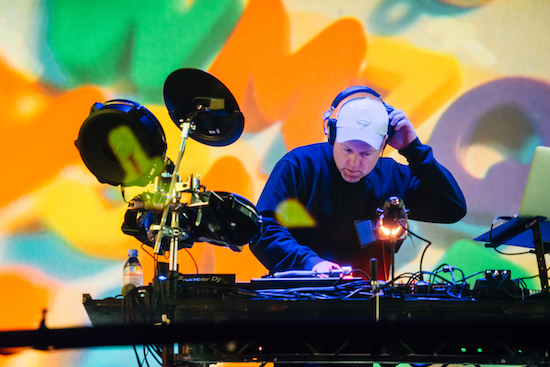Live photography by Carolina Faruolo
It’s the perennial problem for the artist even slightly long in the tooth: how do you keep your long-term fans happy by playing the stuff they love you for, while ensuring you retain enough interest in tracks you’ve played hundreds of times live to stop them sounding stale?
It’s bad enough for traditional line-ups using live instruments, but for anyone making sample-based or DJ-led music, the challenge is multiplied by the difficulties inherent in improvising or adjusting tone, arrangement or delivery on stage. Then there’s the fact that, if you’re a solo act, there’s only so many seconds you can hope to keep a few thousand people interested in you standing there on stage, alone, behind a pair of turntables.
DJ Shadow hasn’t had to spend much time wrestling with these conundrums throughout his quarter-century career. Early on he acknowledged the second of these issues and began an association with visual artist Ben Stokes that is as long-standing and vibrant a creative partnership as exists within many rock bands.
From relatively simple strategies – busy animations projected onto screens above the stage – the pair have embraced increasingly complicated approaches. Nine years ago the Shadowsphere tour found the DJ performing inside a giant globe, like a sampleaholic Joe 90. This time, the solution is similarly redolent of a certain kind of ’60s kitsch – a circular screen surrounds Shadow and his equipment, like a giant lampshade, with projectors bouncing moving images behind, in front and to either side.
Musically, too, Shadow set his live-performance template a while ago, and since it still works, he’s seen no need to mess about with it. Rather than just playing tracks, he constructs his set as a series of lengthy medleys or mixes, songs from different parts of his discography brought into new and often unexpected conjunctions, as if the past and the present are pitted in battle for the audience’s hearts and minds. This seems particularly important in our current epoch, where the digital culture Shadow expressed deep discomfort with on The Less You Know, The Better in 2011 and actively satirised on last year’s brilliant Our Pathetic Age means every critique insists on comparing his new music with the groundbreaking debut he made in the mid-90s.

It is telling that when he dips in to Endtroducing he does so excedingly sparingly Much more of the set is culled from that record’s less lauded yet far superior follow-up, The Private Press, including a dizzying collage of the delicate ‘Six Day War’ and ‘Walkie Talkie’s bombastic beats that somehow fits perfectly between the tectonic title track of The Mountain Will Fall and ‘Nobody Speak’s pugilistic combination of delicate guitar, ominous bass and raps from Run The Jewels that snap and snarl all the way from cocksure posturing to the edge of chaos.
Even the largely (and unfairly) maligned The Outsider gets greater shine in Stoke’s circular spotlight – ‘This Time (I’m Gonna Try It My Way)’ is essayed in full, the optimism of its message matched ounce for ounce by the bittersweet backstory (the vocal came from an unmarked test pressing Shadow found when raiding the archives of a defunct radio station, the identity of the singer unknown to this day); a David Banner verse of righteous fury from ‘Seein’ Thangs’ climbs its way out of ‘I’ve Been Trying’, layers of music piled on top of foundations of meaning as a skyscraper of sound is constructed before our ears. That all these moments are at least as rapturously received as the quick flit through ‘What Does Your Soul Look Like?’ and a dyptich from the first U.N.K.L.E. album (‘Lonely Soul’ morphing into ‘Guns Blazing’) suggests that he’s read his audience astutely.

What is new – or, at least, newly resonant – this time around is Shadow’s apparent determination to convince doubters that the music he’s making today comes from the same place as the beloved records of so long ago. The juxtapositions throughout the set reinforce this message, as do the humble and very obviously sincere words of thanks he gives to the audience for coming out to see him, for allowing him to come back to a venue he hasn’t played in over a decade, and had set his heart on playing one more time.
But everything comes together in a staggering finale, where ‘Organ Donor’ is pulled apart, its components tweaked and reshaped, then the whole thing put back together again into something at once recognisably the Endtroducing song and yet sounding as fresh and as planet-swallowingly vast as anything on the (again, apparently quite widely misunderstood, and definitely very underrated) first disc of Our Pathetic Age. As Stokes’ visuals evoke a 3D version of a technical drawing in motion – the kind of thing Tony Stark would flip around in the lab while trying to explain time travel to the rest of the Avengers, only with diagrams of devices that look like they were made in the 1950s – Shadow turns the song inside out: slowing parts while speeding-up others, driving the bass through the floor while the high end shoots for the sky, he turns his past into the future. It’s something to behold.



